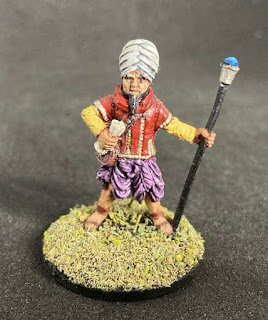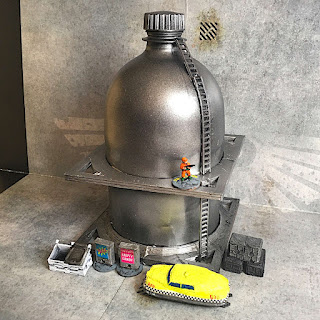Possibly the hardest lesson for a new Games Master to learn is how to say Yes.
The temptation to keep your players on the path of destiny you have spent many hours writing for them is very strong but belies a fundamental failing in your thinking. RPGs are not books, they are not linear plotlines where you control every aspect of the story.Remember that RPGs are collaborative stories where the agency and actions of players help to create the storyline. Once you say No to a player, once you remove player choice you remove player engagement and the fun goes out of the window. This is commonly referred to as Railroading and will lead to far bigger problems further down the track.
The GM must always consider what the essential elements of your overarching plot are and ensure that you spend all your energy preparing multiple ways that the players might achieve them.
Essential elements of plots
I have written previously that my favourite way of writing plots is by using Nodal Design. This approach is most commonly found in the Choose Your Own Adventure gamebooks such as Fighting Fantasy or the Tunnels & Trolls solo games made popular in the 80s.
My approach is to break a plot line down into a series of encounters. The most important of these are going to be the Must Happen encounters. These are the events that have to happen to further the plot and the ones which you should spend the most time considering all the possible eventualities.
You should always consider that:
- the players might fight their way in and out of an encounter even against impossible odds.
- the players may run away
- the players may never find this encounter in the first place.
The rule of three
- PCs win the fight - this is your everything goes according to plan exit
- PCs lose and get captured
- PCs lose and escape or run away
- PCs stealthily go around or avoid the encounter
However, if the PCs need to acquire some object or information then outcomes 2,3 and 4 are going to pose you with a problem. Careful consideration of the potential outcomes of your Must Happen encounter will lead you to preparing plausible solutions.
PCs lose and get captured
Getting captured can often be a blessing in disguise as the PCs might be taken inside the enemy stronghold. Here they will learn much more about their enemies strengths and weaknesses, the location of the big bad guy, location of an uber artifact or they might meet other prisoners who can join them in their quest or help them escape.
You also get the additional free bonus breakout encounter which are always fun and stressfull for PCs.
PCs lose and escape or run away
This outcome presents the greatest challenge in that they may not learn or aquire what they need to progress. This is where the rule of 3 comes in. For something to be an essential Must Happen there must be at least 3 ways of achieving it. If it's information the players are after then this can be heard during scouting or in combat. If it's an object then it might get lost by the enemy or found by the players during the confusion of melee. Perhaps it gets dropped into the river and the players find it later whilst licking their wounds.
PCs stealthily go around or avoid the encounter
Whilst this sounds like a worse case scenario from an encounter preparation perspective, it is often the easiest to compensate for in the planning stage. Whilst going around the encounter they might overhear the vital piece of info they need, they might see or find the item they need unguarded.
Evil minions tend to be left out out of the loop on the overarching plot, they get told the bare minimum to get by. Guard that door, go get that box rather than what's behind the door or what's in the box. Use this to your advantage and convey some info which is meaningless to minions but useful to your PCs.
Insurmountable odds and revealling the big bad guy too early
One of the fatal mistakes I have seen new GMs make is to introduce an encounter with the Big Bad Guy too early. Big Bad Guys are usually way too powerful for the PCs to handle early on in the game and a critical element of RPGs is that PCs need to gain experience and become more powerful in order to defeat the Big Bad Guy.
Pitching your heroes into a battle with the Big Bad Guy too early risks them getting killed or worse that they might damage your Big Bad Guy. The temptation to say "No you can't do that" is great and leaves you needing to construct a plausible explanation as to why the PCs wouldn't be slaughtered in an instant. This is just poor storytelling from an RPG standpoint and means you have unnecessarily backed yourself into a corner. Time to look at other ways to let your players know about the Big Bad without them confronting him early on.
The third party reveal
In other types of fiction the power of the Big Bad Guy is often witnessed by third parties who get killed early on and their only role in life is to illustrate that power. For example a Big Bad Guy might attack a village or sack a town and in a film or a book you might witness this encounter from the eyes of an NPC.
The fate of the NPC is irrelevant as the object of the scene is to convey this information to you the viewer. However, in RPGs it is more than acceptable for that NPC to live just long enough to share what they saw to the players before they die.
Rumours are another great way to seed knowledge of some power sweeping across the land. The PCs may encounter refugees fleeing a besieged city, a trader who just got through a checkpoint or left a neighbouring town before the horde arrived.
How you achieve the reveal is entirely down to you but my advice is to dribble the information out a little bit at a time. Give your PCs enough time to grow as a party and as individual characters so that they are ready to face off against the big bad guy in the finale.
Don't forget the backstory
The PCs might also have acquired first hand knowledge of the Big Bad Guy through their backstory. For example in the classic fantasy movie Conan The Barbarian (1982), the young Conan witnesses his tribe slaughtered and he is enslaved by the forces of Thulsa Doom. It is only many years later once he has gained his freedom and become a mighty warrior that he faces off against the evil sorceror and avenges his family.
PCs need time to become a thorn in the big bad guy's side
A common trope among big bad guys is that they often overestimate their own power and underestimate their foe. Many of the best fictional showdowns come after a long protracted series of small skirmishes and defeats for the big bad guy until he really does have to deal with the threat personally. How many times have you heard them say...
"Do I have to do everything myself?"
Take Darth Vader for example, in Star Wars. He takes charge and jumps in his TIE Fighter to personally see off the threat of the X-Wing attack on the Death Star. Perhaps he senses the presence of Luke or perhaps he recognises that although the chance of success is remote in the face of overwhelming odds, the chance still exists.
Flipping this encounter on its head, the Death Star exploding is a Must Happen event and only a bad storyteller would have the bad guy he has spent the last hour and a half setting up die. That happens to Snoke in Star Wars: The Last Jedi and we all know what we think of that movie.
Embrace Player Agency
One of the most frustrating but fun things in RPGs is that players often come up with creative solutions to the problems that you set them. This is a fundamental aspect of RPGs and will necessitate that you change and modify your story to accomodate the players.
Embrace this. Learn to be fluid and to react to your players. Be the Leaf on the Wind. Let go and enjoy the unbridled chaos...






























